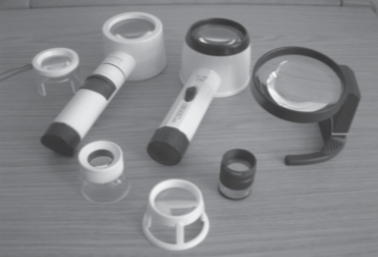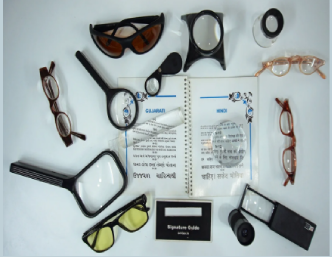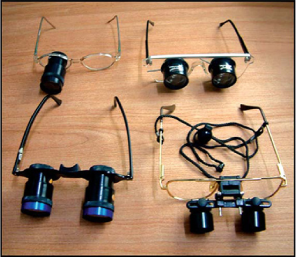Diabetic Retinopathy: Early Signs and Effective Management
Diabetes is one of the deadliest diseases known to mankind. It affects about 1 in 11 people worldwide. As for…
An individual disability with low vision is one who has of visual working indeed, even after treatment, as well as standard refractive remedy, and has a visual keenness of under 6/18 to light discernment or a visual field of less than 10 degrees from the mark of obsession, yet who utilizes, or is possibly ready to utilize, vision for the preparation as well as execution of an errand. Low Vision is that can't be adjusted by common glasses, contact focal points, drug or medical procedure is designated "low vision".
An optical/non-optical device that improves or enhances residual vision by magnifying the image of the object at the retinal level.
When considering magnification in low vision devices, important factors include the right power for the individual's needs, field of view, image clarity, suitable working distance, lighting, portability, contrast adjustment, and professional guidance. These factors ensure effective and comfortable use, improving daily activities for individuals with low vision.



1. Age-related macular degeneration (AMD): A common cause of low vision in older adults, affecting the central vision.
2. Glaucoma: Group of eye conditions damaging the optic nerve, leading to progressive vision loss.
3. Diabetic retinopathy: A complication of diabetes damaging blood vessels in the retina, causing vision problems.
4. Cataracts: Clouding of the eye's natural lens, resulting in blurry or dim vision.
5. Retinitis pigmentosa: A genetic disorder causing gradual vision loss due to retina cell breakdown.
6. Stroke affecting visual processing areas: Visual impairment caused by a stroke impacting the brain's visual processing.
7. Traumatic eye injuries: Severe injuries to the eye causing permanent vision loss or low vision.
8. Congenital conditions: Visual impairments or genetic conditions present from birth causing low vision.
9. Infections or inflammations of the eye: Certain infections or inflammatory diseases damaging eye structures and leading to low vision.
10. Other eye diseases: Conditions like macular dystrophy, retinopathy of prematurity, and optic neuritis causing low vision.
1. Magnifiers: Optical devices that enlarge text or objects to aid those with low vision, available in various forms like handheld, stand, and pocket magnifiers.
2. Telescopic lenses: Devices using lenses to magnify distant objects, helping individuals with low vision see things at a distance, such as road signs or classroom boards.
3. Closed-circuit televisions (CCTVs): Systems utilizing video cameras and displays to magnify printed material or images on a screen for easier viewing.
4. Electronic magnifiers: Portable devices with electronic screens that magnify text or images, some offering contrast adjustments and color enhancements.
5. Computer screen magnifiers: Software applications that enlarge content on a computer screen, making it easier for those with low vision to read emails, browse the web, or work on documents.
6. Screen readers: Software programs converting text into speech, enabling individuals with visual impairments to listen to content displayed on a computer screen.
7. Talking clocks and watches: Devices audibly announcing the time, date, or alarm settings for easy timekeeping.
8. Large-print books and materials: Books, calendars, and printed materials with larger fonts to aid those with low vision.
9. Tactile graphics and braille materials: Raised-line drawings and braille books providing access to information for individuals who are blind or have severe visual impairments.
10. Electronic handheld devices: Smartphones and tablets equipped with accessibility features like screen magnification, voice control, and text-to-speech capabilities.
11. Audio description devices: Used in theaters or cinemas to provide descriptive narration of visual elements during movies or performances.
12. Prism glasses: Glasses with special prisms to help individuals with visual field loss expand their usable field of view.
Assessing a low vision patient involves a comprehensive evaluation by an eye care professional or specialist, including medical history, visual acuity, visual field, and contrast sensitivity testing. It also includes functional vision assessment, identifying specific needs and goals, evaluating lighting conditions, trying low vision aids, providing training, addressing psychosocial well-being, and collaborating with other specialists for a comprehensive care plan.
By conducting a thorough assessment, the eye care professional can tailor a personalized low vision rehabilitation plan to maximize the patient's remaining vision, enhance their functional abilities, and improve their overall quality of life.
Diabetes is one of the deadliest diseases known to mankind. It affects about 1 in 11 people worldwide. As for…
Think about waking up on a random morning and finding a tiny red bump sitting on your eyelids. You touch…
Do you spend long hours staring at the screen or reading fine print? If so, you might have experienced tired…